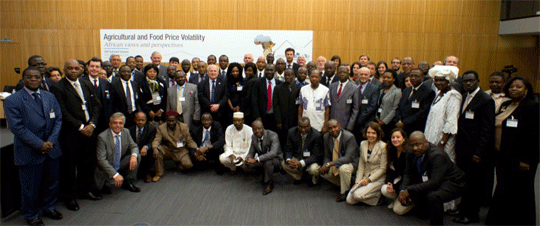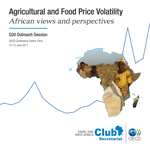Agricultural and food price volatility: African views

|
Why? | Documents | Videos | Images | Press | Participants | Contact |
Messages for the G20
|
Africa's voice must be heard Agricultural and food price volatility is a common challenge for all members of the international community. While African governments have developed their own policy responses, Africa’s voice also needs to be heard more strongly and be more systematically represented in global debates and fora such as the G20. |
More investment in agriculture Higher food prices need to benefit African agricultural producers. More investment in agriculture is needed. Despite enormous agricultural potential, many African countries are significant net food importers. |
|
Transparency and functionning of markets Improved transparency and better access to information on global commodity markets would contribute to reduce the risks of excessive price volatility. Good information will help reduce price volatility. |
|
In the run-up to this month’s G20 summit on agriculture, the SWAC Secretariat invited African representatives and experts to present their viewpoints on the impact of price volatility on African economies in order to search for practical solutions and policy options in the African context. > download the Conference booklet |
|
Agricultural and Food Price Volatility This video presents the objectives of the Conference and the role of the Sahel and West Africa Club and the OECD.
|
Background
The volatility of international food and agricultural prices directly impacts on the ability of African households to feed themselves, as witnessed by the 2007-08 food crisis. Despite good farm yields in 2010, food security could be under threat in some parts of Africa in 2011, if the sharp rise in world prices for maize, rice, wheat etc., causes price increases in Africa. The 26th annual meeting of the Food Crises Prevention Network in the Sahel and West Africa (RPCA), held in Accra on 14-16 December 2010, alerted public opinion to this risk. Price instability also affects the ability of producing States and African farmers to invest in order to respond to structural growth in domestic and international demand, whether for food or for agricultural raw materials.
This problem, which particularly affects developing countries and emerging economies, was put on the agenda of the G20 in Seoul in November 2010 and ranks among the priorities of the French presidency in 2011. Together with the FAO, the OECD is co-ordinating the preparation of a joint report with IFAD, the IMF, UNCTAD, WFP, the World Bank and the WTO in order to propose policy options to the G20. IFPRI and the UNHLTF are also participating in the process.
At the request of SWAC Members and in co-ordination with the OECD Development Cluster, the SWAC Secretariat is organising this conference to discuss and draw attention to African views and perspectives. The OECD Trade and Agriculture Directorate will present current thinking on policy options. The African regional and continental organisations, development banks and the representatives of agricultural producers will present their views, experiences, and suggestions. The co-chairs of the G20 Development Working Group (France, South Africa and South Korea) and country facilitators of the Food Security sub-group (Brazil, Canada, France and Japan) will also take part in this conference. > learn more
- Share with African representatives information on recent experiences, lessons learned and the current state of thinking in preparation for the G20 on agriculture and development issues.
- Draw attention to the views and perspectives of institutional and socio-professional representatives of agricultural interests and food security in Africa.
- Stimulate ongoing thinking and discussion among African regional economic organisations towards setting up regional instruments to respond to price volatility and improve food crises prevention and management.
- Provide inputs for global discussions of the issue within the G20.
- Session 1: based on short presentations followed by discussion, the session will share knowledge and perceptions of price volatility and its impact on food security and economic development in poor countries.
- Session 2: A discussion panel will facilitate the search for policy options and possible ways to improve management of risks to protect vulnerable populations more efficiently.

- African inter-governmental and economic organisations: ECOWAS, UEMOA, CILSS, SADC, CEMAC, CEEAC, IGAD; COMESA, etc.
- Pan-African and international organisations: AU/NEPAD Planning and Co-ordinating Agency (NPCA), UN Economic Commission for Africa (UNECA);
- African banks: African Development Bank (AfDB), West African Development Bank (BOAD);
Farmers’ and civil society organisations: Agricultural Consultants Association (ACA), African Cotton's Producers Association (APROCA), Pan-African Organisation (PAFO) and the West Africa Farmers Association (ROPPA); - African scientists and experts: African Association of Agricultural Economists (AAAE), African Economic Research Consortium (AERC), Association for Strengthening Agricultural Research in Eastern and Central Africa (ASARECA), Forum for Agricultural Research in Africa (FARA), West and Central African Council for Agricultural Research and Development (CORAF/WECARD);
- The joint chairs of the G20 Development (France, South Africa and South Korea) and the facilitators of the Food Security sub-group (Brazil, Canada, France and Japan);
- Technical and financial partners: OECD, FAO, Alliance for a Green Revolution in Africa (AGRA), Common Fund for Commodities (CFC), French Development Agency (AFD), International Development Research Centre (IDRC).
Published articles:
- Reuters: L'Afrique avance des pistes au G20 contre la volatilité agricole, by Marion Douet
- RFI: Impact de la volatilité des prix agricoles sur les productions africaines, by Jean-Pierre Boris
- Agriculture: Higher prices here to stay, says OECD-FAO report
-
Co-ordinator: Sibiri Jean Zoundi
Useful links
- OECD Agriculture nd fisheries website: www.oecd.org/agriculture
- OECD-Africa Portal: www.oecd.org/africa
Related Documents

